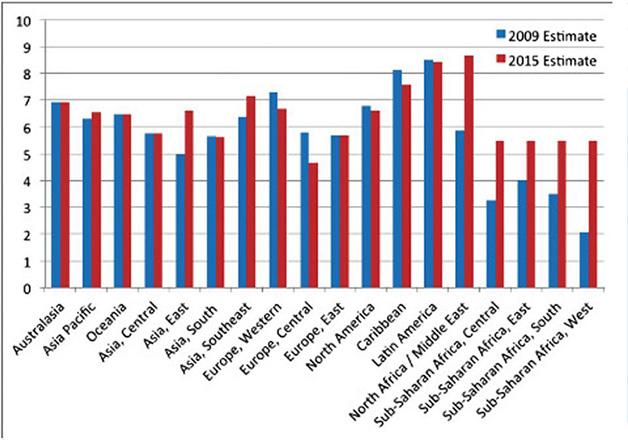World Alzheimer Report 2015: Revised Estimates Hint at Larger Epidemic
Quick Links

A Global View: The World Alzheimer Report 2015 updates statistics on the international plight of dementia. [World Alzheimer Report 2015, ADI.]
Alzheimer’s Disease International yesterday released its World Alzheimer Report 2015: The Global Impact of Dementia. This seventh annual report from the federation of Alzheimer associations updates 2009 estimates of the global incidence, prevalence, upcoming trends, and cost of dementia, finding that almost 47 million people now live with this group of diseases. With new data to project how many will develop dementia and at what cost, the report bumps up the scale of the coming epidemic by 12 to 13 percent from previous estimates.
"We are looking at roughly a doubling in the numbers every 20 years,” said co-author Martin Prince, King’s College London, in an online television introduction to the publication. However, Prince added, “This trajectory of growth may be changed by efforts to do more to prevent the onset of dementia.”
In 2009, the ADI predicted that 65.7 million people would have dementia in 2030, rising to 115.4 million in 2050. The 2015 report revises that projection with data from 106 additional studies, which better cover East Asia, sub-Saharan Africa, North Africa, and the Middle East. Prince and colleagues now estimate that 74.7 million people will have dementia in 2030, and 131.5 million in 2050. The authors noted that these changes do not reflect trends toward increasing or decreasing dementia in certain regions, only better sampling. With the new data, prevalence in the population older than 60 now appears similar across world regions, said Prince (see image below). As predicted in 2009, low- and middle-income countries will be disproportionately affected due to more rapid population aging (May 2012 news). Right now, 58 percent of dementia sufferers live in these countries; they will make up an estimated 63 percent of the total in 2030, and 68 percent in 2050.

Facts and Figures Update. Estimated prevalence of dementia for people over 60. [World Alzheimer Report 2015, ADI.]
Other data in the report do reflect changes in prevalence over time, although the authors note that this data is too weak to draw firm conclusions. Some studies have suggested that prevalence is stabilizing or even falling in high-income countries (July 2014 news). In an August 21 Policy View in Lancet Neurology, first author Yu-Tzu Wu and senior author Carol Brayne at the University of Cambridge, England, and colleagues noted that five studies demonstrated steady or declining dementia prevalence in Europe during the past 20 to 30 years—despite a graying population there. Wu and colleagues attributed this trend to better education and living conditions, as well as improved prevention and treatment of vascular and chronic conditions. They suggested this could hint at strategies to reduce dementia globally. The authors of the ADI report, who include Wu, note that other studies hint at a growing prevalence in Japan and Sweden, and that obesity, diabetes, and worsening cardiovascular health are increasing in countries around the globe. These countertrends will likely offset any declines, and boost the prevalence of dementia worldwide, they note.
In the ADI report, worldwide incidence estimates for dementia have risen to 9.9 million new cases each year, up from 7.7 million in the 2012 World Health Organization/ADI report, Dementia: A Public Health Priority. It also puts a dollar amount on the global cost of dementia—$818 billion dollars in 2015, up 35 percent from $604 billion in 2010. The authors estimate that will climb to $1 trillion in 2018 and $2 trillion by 2030. “The costs of dementia care are rising more rapidly than the numbers of people with dementia,” said Prince. “Costs inflate quickly.”
To combat the rise in these cases worldwide, the ADI calls for expanded global action to reduce risk for dementia, boost research into prevention, treatments, and cures, create dementia-friendly communities, improve care, and raise awareness. The full report is available here, along with key facts and figures, policy recommendations, and resources for patients and the public.
Bupa, a global health insurance and care company, supported this report.—Gwyneth Dickey Zakaib
References
News Citations
- Dementia Numbers in Developing World Point to Global Epidemic
- Falling Dementia Rates in U.S., Europe Hint at Prevention Benefit
External Citations
Further Reading
Primary Papers
- Wu YT, Fratiglioni L, Matthews FE, Lobo A, Breteler MM, Skoog I, Brayne C. Dementia in western Europe: epidemiological evidence and implications for policy making. Lancet Neurol. 2016 Jan;15(1):116-24. Epub 2015 Aug 21 PubMed.
Annotate
To make an annotation you must Login or Register.

Comments
No Available Comments
Make a Comment
To make a comment you must login or register.